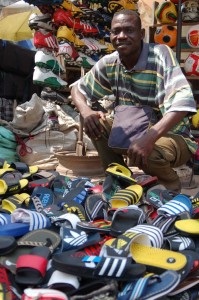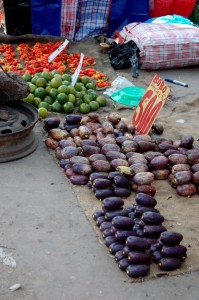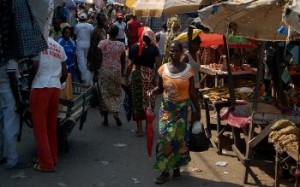
Meet Simon. Simon was among HOPE Congo’s first group of microfinance clients in Brazzaville. He sells sandals from a low table on a dusty street in the clothing district of Brazzaville’s largest and most important open-air market, Le Marche Total. He uses the modest profits from his business to help support a family of six people, including his first grandchild.
Simon has been selling sandals for quite some time now, but before working with HOPE Congo, he had never accessed a small business loan. He put his first loan to work to increase the selection and size of his inventory. Now, just a week after receiving his loan, his small stand is more eye-catching, and his stock sits a few inches off the ground on a low table. He is hopeful that he’ll be able to capitalize on what he learned through his biblically-based loan training sessions to make wiser business decisions and successfully repay his loan. One of the training elements that stood out to him most was HOPE’s emphasis on savings. “This is an advantage for clients, and it is unique,” he explains. “We are generally not encouraged to save. We spend money as we get it. I learned that if I plan and save, I will be able to do a better job with my business, and I will be able to repay, get more loans and grow.”
Simon is soft-spoken and humble, but he has ambition. He wants his business to grow and be more profitable for his family. He dreams of being able to travel and pay for his children to travel. He also has a specific goal for his business – to improve the variety of his stock and grow until the point when he can afford a boutique like those behind his small table. Now Simon is one step closer to achieving his dream.

Simon’s business reflects the stories of many Congolese entrepreneurs who are moving forward along a common procedure for scaling small market-based retail businesses. In Le Marche Total, most vendors start out with a very small inventory, and they cannot afford to pay taxes to the market to set up a table. So they start with a tarp or rice sack spread on the ground, covered with a small spread of lemons or peanuts or eggplants. After working for some time, they might be able to afford a low table (like Simon’s) that keeps their product out of the dust. Later, maybe they can upgrade to a higher, larger table. With a little luck, they might graduate to a free-standing kiosk that better displays a variety of wares and attracts customers. But the resale vendor at Le Marche Total has not truly reached his peak until he can afford to rent what Simon is also dreaming about: a boutique. With four concrete walls, shelves, padlocks, and exterior wall space that can be used to advertise, the boutique offers entrepreneurs the ability to stockpile goods and protect equipment in one central location. But more than that, the boutique is a status symbol for Congolese entrepreneurs. It is the sign of a stable, prosperous, and respectable business.
This progress, this gradual but steady development of assets, is something HOPE Congo Managing Director Simeon Havyarimana recently described – indeed, acted out – to the guests at HOPE’s Evening of Never Ending HOPE event in Lancaster PA. “This is how microfinance works: I lend you a little money,” he says as he figuratively hands money to the client, “and you use it to grow your small business.” He points to a low spot near his knees. Then he points a little higher. “Because you have grown, you can pay me back.” He pantomimes receiving the client’s first reimbursement. “Then, I lend you more money, you use it to grow your business more, and now you have more, so you can pay it back,” raising his voice a little, he repeats the same motions, but now the ‘business’ has grown chest high. “I lend to you again, and you have even more, so you can pay it back. And it keeps going.” His voice is loud with excitement, and he raises his hands higher, fingers stretched wide, until they are above his head. “Now…now look at how much you have!” 















